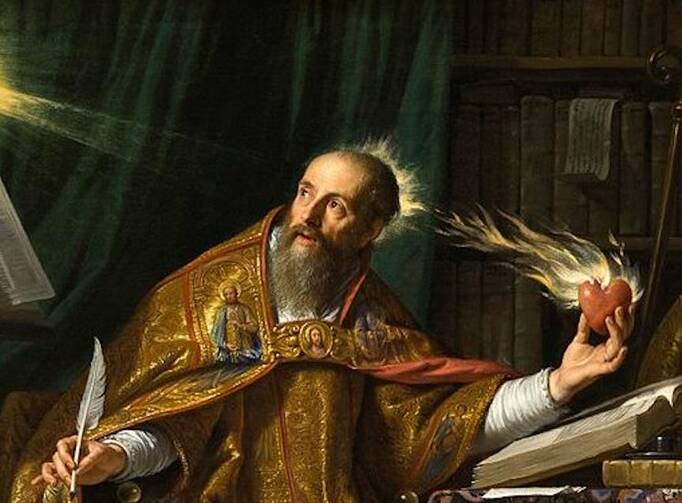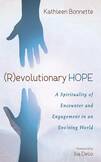Review: St. Augustine in dialogue with the 21st century
In 2016, HuffPost published an article about St. Augustine, “An Ancient Philosopher’s Brilliant Theory Explains Everything Bad You’ve Ever Done.” Written for an online audience accustomed to New Age, quick-fix approaches to spirituality, it focused on St. Augustine’s concept of rightly ordered love and his theory that we sin when we put love of self and other worldly things above love of God. Implicit in the article was a mild sense of surprise that a long-winded theologian from the fifth century could say anything of value to modern readers who seek affirmation in online personality quizzes and seven-second sound bites.
In her new book, (R)evolutionary Hope: A Spirituality of Encounter and Engagement in an Evolving World, Kathleen Bonnette has brought St. Augustine’s philosophy into dialogue with 21st-century reality in ways that would impress even modern mindfulness gurus and internet pundits. The slim, genre-jumping volume is part memoir, part theology, part philosophy of science, part evolutionary theory, and part political commentary on civil and ecclesial issues of our day. It is simultaneously a “big picture” view of the world and an intensely personal reflection. Bonnette invites readers into her thought process and personal journey of spiritual growth, even to the point of acknowledging the struggles she faced when editing early drafts of the book itself.
In theme and in style, (R)evolutionary Hope displays a thoroughly Augustinian approach to thinking. Like many of St. Augustine’s writings, Bonnette’s work relies on personal experience to illustrate complex ideas. Augustine’s Confessions was a work of theology as well as a deeply personal self-revelation. Bonnette walks her readers through a similar story of self-discovery, written from the perspective of a convert to Catholicism whose theological worldview has evolved as she progressed into adulthood. She shares how her perspective was shaped by her social outreach work for the School Sisters of Notre Dame as well as by marriage and motherhood. Drawing parallels between modern-day culture wars and the turbulent times in which St. Augustine lived, she tries to make sense of our day just as St. Augustine sought meaning during the fall of the Roman Empire.
Bonnette grounds heady concepts with concrete and familiar imagery, as when she introduces a cerebral chapter about the theology of matter, energy and evolution with a relatable tale about teaching her own children how to find the essence of the Big Bang theory in the biblical creation story. That she can transition so effortlessly from personal anecdote to quantum theory without losing the reader’s attention or derailing her own train of thought is breathtaking. She demonstrates that a mother’s heart and the stars of the galaxy are equally vast and complex.
This short chapter on cosmological spirituality serves as a centerpiece of sorts. It seeks to find God in the relationships between matter and energy that constitute our universe, and which science itself is beginning to understand as a complex web of interconnections that Bonnette compares to the mysteries of the Trinity. Just as the triune God can be seen as a relationship, so science increasingly understands all of existence, all of human consciousness and all of reality as an infinite set of relationships in which nothing is truly independent of anything else or of the fundamental forces of creation. Einstein’s theory of relativity—that everything is relational—has parallels to Christian theology that defines God as love and love as the product of relationships.
Bonnette uses her own personal faith journey from childhood to adulthood as a proxy for the development of humanity’s moral code since St. Augustine’s lifetime. Science evolves in a similar way. Copernicus might have been the greatest astronomer of his day, but he would struggle mightily to understand the concept of a black hole. If Galileo could somehow have gotten his hands on a physics textbook from 2024, most of it would have gone right over his head. These great minds could not understand, in their day, what it took generations of later scientists to uncover, even if those discoveries were built off the foundation of those scientists’ work. In a similar way, Bonnette shows how Augustinian theology can mature with the times and reflect the reality of a society that has evolved for nearly 16 centuries since St. Augustine’s death.
It is refreshing to see cosmology, science and evolutionary biology described as evidence for God—not merely as justification for intelligent design or indirect proof of God’s fingerprints on creation, but as part and parcel of God’s existence and continued presence. There was perhaps some opportunity to bring in other theologies of evolution and science—such as the work of Pierre Teilhard de Chardin, S.J.—but Bonnette keeps the discussion focused on St. Augustine and his interpreters.
The final few chapters shift seamlessly into a reflection on the School Sisters of Notre Dame and other Catholic sisters who live out their commitment to care for all of creation through their vows. Bonnette handles this sharp shift in tone and genre effortlessly. The experience of the sisters with whom Bonnette has worked becomes an allegory for the challenges that all people face in embracing love over selfishness.
Framing the sisters’ story through the theological controversy that began in 2009, when the Vatican’s Congregation for the Doctrine of the Faith undertook an investigation of the Leadership Conference of Women Religious, Bonnette shows how the Catholic sisters used even the sharpest criticism from church authorities as an opportunity to strengthen, rather than sever, their relationship with the church and its people. Their actions were refreshing in an age when important relationships often fall victim to baser human instincts to “win” rather than “resolve” arguments, or to be “heard” rather than to listen and love.
The denouement in the final chapter is a theological exhortation to act as God’s hands in the world, not simply to pray that God’s will will be miraculously enacted. It is a reminder that prayer does not alleviate the responsibility to take action but instead inspires action.
Bonnette assumes that readers are at least familiar with St. Augustine, and esoteric ideas are sometimes presented with limited context or explanation. This reader had to keep a copy of Confessions close at hand to understand the full implications of some arguments. St. Augustine looms so large that some reference to the Augustinian theme of the book, perhaps in the title, would have been useful to warn readers of that barrier to entry. Nonetheless, the learning curve is not overwhelming for readers without theological backgrounds.
Some of the best works of theology and philosophy are those in which the authors share how they personally have come to understand the world—how their particular life circumstances and years of intellectual inputs in school and at home have allowed them to make sense of this messy existence. St. Augustine did it. John Henry Newman did it. Hildegard of Bingen did it. Their insights continue to shape our worldview today. Every so often, books like Bonnette’s remind us that it is not just the ancients who have something useful to say.











